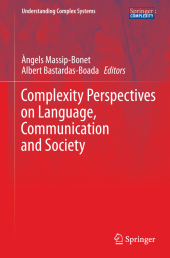 Neuerscheinungen 2014Stand: 2020-02-01 |
Schnellsuche
ISBN/Stichwort/Autor
|
Herderstraße 10
10625 Berlin
Tel.: 030 315 714 16
Fax 030 315 714 14
info@buchspektrum.de |

Albert Bastardas-Boada, ·ngels Massip-Bonet
(Beteiligte)
Complexity Perspectives on Language, Communication and Society
Herausgegeben von Massip-Bonet, ·ngels; Bastardas-Boada, Albert
2013. 2014. xvi, 256 S. 21 SW-Abb.,. 235 mm
Verlag/Jahr: SPRINGER, BERLIN; SPRINGER BERLIN HEIDELBERG 2014
ISBN: 3-642-43961-6 (3642439616)
Neue ISBN: 978-3-642-43961-2 (9783642439612)
Preis und Lieferzeit: Bitte klicken
Rather than focusing on complexity as often discussed in physics or computer science, this book examines more ´human´ or socially oriented perspectives on complexity, taking account of the language and communication singularities of human agents in society.
The "language-communication-society" triangle defies traditional scientific approaches. Rather, it is a phenomenon that calls for an integration of complex, transdisciplinary perspectives, if we are to make any progress in understanding how it works. The highly diverse agents in play are not merely cognitive and/or cultural, but also emotional and behavioural in their specificity. Indeed, the effort may require building a theoretical and methodological body of knowledge that can effectively convey the characteristic properties of phenomena in human terms.
New complexity approaches allow us to rethink our limited and mechanistic images of human societies and create more appropriate emo-cognitive dynamic and holistic models. We have to enter into dialogue with the complexity views coming out of other more ´material´ sciences, but we also need to take steps in the linguistic and psycho-sociological fields towards creating perspectives and concepts better fitted to human characteristics.
Our understanding of complexity is different - but not opposed - to the one that is more commonly found in texts written by people working in physics or computer science, for example. The goal of this book is to extend the knowledge of these other more ´human´ or socially oriented perspectives on complexity, taking account of the language and communication singularities of human agents in society.
Our understanding of complexity is different - but not opposed - to the one that is more commonly found in texts written by people working in physics or computer science, for example. The goal of this book is to extend the knowledge of these other more ´human´ or socially oriented perspectives on complexity, taking account of the language and communication singularities of human agents in society.


